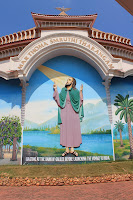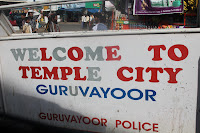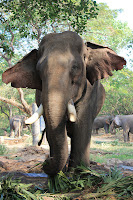Day 3 12/14/2012 6 am
Last night we were officially welcomed by the Franciscan brothers
to their with a ceremony that included being anointed on the forehead with some
orange and red paste called dilak and being given a garland of jasmine flower buds
and a red rose. If only computers had the capability to retain and share scents.
We also received a coconut as a beverage.
Very refreshing. The friars are great, very welcoming and caring.
Fr. Damian
Fr. Damian

Our garland of jasmine & rose
 Fr. Leo - he organized my trip in reference to who I see, transportation, etc.
Fr. Leo - he organized my trip in reference to who I see, transportation, etc. 
 Today's adventures were structured around the different faiths
and their practices here in Kerala. We started
at the shrine at Azheekode, where St. Thomas (doubting Thomas) where his right arm
bone is a relic. I did not feel comfortable
taking a picture of it as I walked by.
Today's adventures were structured around the different faiths
and their practices here in Kerala. We started
at the shrine at Azheekode, where St. Thomas (doubting Thomas) where his right arm
bone is a relic. I did not feel comfortable
taking a picture of it as I walked by. 
 Afterwards
we did watch a 30 minute multimedia presentation of his life in India - quite interesting
with a bit of bedazzlement added.
Afterwards
we did watch a 30 minute multimedia presentation of his life in India - quite interesting
with a bit of bedazzlement added. 
 We also
went to the 2nd oldest Juma Mosque in the world, Cheraman Juma Masjid and went through
its small museum. The curator led some great
discussions as well as Prof. Ali. This was
a special place for him because it was Friday and this mosque holds Friday prayer
services. the mosque was originally a Buddhist temple and became a mosque around
620 ad.
We also
went to the 2nd oldest Juma Mosque in the world, Cheraman Juma Masjid and went through
its small museum. The curator led some great
discussions as well as Prof. Ali. This was
a special place for him because it was Friday and this mosque holds Friday prayer
services. the mosque was originally a Buddhist temple and became a mosque around
620 ad. 

 On our way to the elephant sanctuary we passed a Hindi temple. A 3 months holiday is occurring
so we saw lots of boys and men in black skirts, which are called lungi, one of the
most popular clothing because of the air circulation. The elephant sanctuary housed about 50 elephants, chained
up. It wasn't a sanctuary as we define the
word.
On our way to the elephant sanctuary we passed a Hindi temple. A 3 months holiday is occurring
so we saw lots of boys and men in black skirts, which are called lungi, one of the
most popular clothing because of the air circulation. The elephant sanctuary housed about 50 elephants, chained
up. It wasn't a sanctuary as we define the
word.
 Following that was a visit to another St. Thomas church - Palayoor. On our
way through the streets we did see an elephant carrying tree debris to who knows
where. Our last destination was the Hindu
temple Trissur in downtown Cochin. As is their rules, we were not able to go within
but some pilgrims did.
Following that was a visit to another St. Thomas church - Palayoor. On our
way through the streets we did see an elephant carrying tree debris to who knows
where. Our last destination was the Hindu
temple Trissur in downtown Cochin. As is their rules, we were not able to go within
but some pilgrims did. The Hindu Temple in Tissur
If I were to summarize the day, it was evident that the different
religious groups integrate well because they respect each other and all value the
role of education for all. We spent a lot
of time in the car but it was interesting to see how folks coexist. As the guidebook stated, "tolerance is not
the acceptance of differences as equally good, right, or valid. it is the acknowledgement that differences must
be endured for one's group to survive. In
fact, it is not tolerance that is the virtue, but coexistence" (pg. 56). In hindsight, this experience of coexistence comes
into play in the survival and success of Assisi Snehalaya, the HIV/AIDS Care Center
we visited on the 15th & 16th.











No comments:
Post a Comment